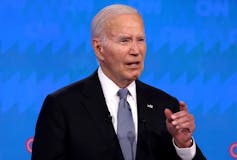
Justin Sullivan/Getty Images
Mary Kate Cary, University of Virginia and Karrin Vasby Anderson, Colorado State University
With four months to go until Election Day, the earliest-ever general election debate featured two presidents – one current, one former – and a lot of bitter personal attacks. Joe Biden’s universally acknowledged poor performance surprised and even panicked Democrats; Donald Trump gave a more forceful – if not truthful – performance.
The Conversation asked two scholars, Mary Kate Cary and Karrin Vasby Anderson, to watch the debate and analyze a passage or a moment that stood out to them. Anderson is a communications scholar with a specialty in gender and the presidency, as well as political pop culture. Cary teaches political speechwriting and worked as a White House speechwriter for President George H.W. Bush, for whom she wrote more than 100 addresses.

Justin Sullivan/Getty Images
Karrin Vasby Anderson, Colorado State University Department of Communication Studies
One of the first definitions of good public speaking I learned as a college debater and student of rhetoric came from the ancient Roman scholar and rhetoric teacher Quintilian. In his 12-volume “Institutio Oratoria,” Quintilian said the ideal orator was a good person, speaking well. He was particularly concerned about the danger that a skilled rhetorician who lacked character could pose to society.
A presidential debate ought to showcase ideal orators – skilled speakers who are also people of character. The June 27 debate offered voters an either-or scenario.
Former President Donald Trump was aggressive, confident and disciplined, but he peppered his remarks with a steady stream of lies, half-truths and misinformation. President Joe Biden focused on Trump’s documented record – both criminal and political – but failed as an orator, demonstrating none of the charisma and command on display during his most recent State of the Union address just four months ago.
The contrast was clear early in the debate when CNN’s Dana Bash asked Trump whether he would block access to abortion medication. Trump said that he would not. He then falsely claimed that, in the lead-up to the 2022 Supreme Court decision that overturned Roe v. Wade and removed the federal protection for abortion rights, “everybody wanted to get it back to the states, everybody, without exception.”
Trump then went on offense, accusing Democrats of taking “the life of a child in the eighth month, ninth month, even after birth.”
Biden’s response was initially clear and resolute: “It’s been a terrible thing, what you’ve done,” he said. And he pushed back against the preposterous claim that “everybody” wanted Roe v. Wade overturned, saying, “the idea that states are able to do this is a little like saying we’re going to turn civil rights back to the states (and) let each state have a different rule.”
But the rest of Biden’s response was muddled. After “veering inexplicably” into an anecdote about a woman murdered by an undocumented immigrant, Biden expressed his support for people’s right to choose by saying on three separate occasions that the decision should be up to a doctor, rather than the pregnant person.
Trump closed out the segment by reiterating his blatant lie in stronger terms: “So that means, he can take the life of the baby, in the ninth month and even after birth because some states, Democrat run, take it after birth.” The Associated Press’s fact check of this claim is succinct: “Infanticide is criminalized in every state, and no state has passed a law that allows killing a baby after birth.”
After nearly a decade of exposure to Trump’s habitual misinformation, lies about states murdering babies may not stand out as shocking in a presidential debate. And, certainly, it’s an argument that should have been easy for Biden to refute.
But if the populace must choose between a good person and someone who spoke well, Quintilian would remind us that someone who speaks well but has no integrity is dangerous.
The consequences for the republic could be dire.

Justin Sullivan/Getty Images
Mary Kate Cary, University of Virginia Department of Politics
I think America just saw history being made.
Within 10 minutes, a very hoarse President Joe Biden, was asked about deficit spending, lost his train of thought, and ended his answer by muttering something about “beating Medicare.” It was awful.
There were so many moments when Biden looked confused and unable to process what was happening. I took notes on key exchanges, but the number of embarrassing episodes, unfinished sentences and incoherent phrases by Biden is too long to list. His answer on why he should be president in his 80s somehow veered into computer chips being made in South Korea.
Former President Donald Trump made his own share of missteps, but overall, he was relatively sharp, and restrained when he was provoked. He scored some points on the issues and did much better than he did in their first debate four years ago. Trump did better than I think many people thought he would.
Our assignment tonight was to find a moment to react to and put it in context. I’ve been to multiple presidential debates and watched many more on television over the years, and have never seen anything like this.
Is there any way the Democrats can convincingly argue for keeping Biden as their nominee?
The bottom line: Moderators Jake Tapper and Dana Bash did a good job of asking substantive questions and keeping control of the debate; Trump missed an opportunity to knock it out of the park but got through it; and Biden will most likely have caused a disaster for the Democratic Party.![]()
Mary Kate Cary, Adjunct Professor of Politics and Director of Think Again, University of Virginia and Karrin Vasby Anderson, Professor of Communication Studies, Colorado State University
This article is republished from The Conversation under a Creative Commons license. Read the original article.
















